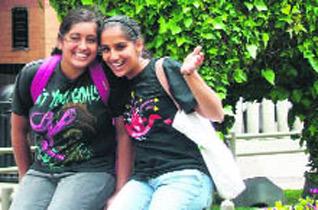Current Events
Seeking Roots: Back to Boarding Schools in Punjab
by SWATI RAI
Most Punjabis and Indians settled or posted in the diaspora are quite happy with the opportunities and facilities in various countries around the world.
However, many Sikh, Punjabi and Indian parents are concerned about their children’s exposure to the Western culture. They feel that there is a tussle between the morals on which they have been brought up and the perceived lack of values that their children are growing up with. As a result, most of the parents have been sending their kids to study in Punjab in the hope of giving them a sound foundation of moral values and academic acumen.
So, is there a clash of civilisations even in the current scenario of international and world-renowned boarding schools in Punjab, where the East truly meets the West?
Are the students able to adjust to the demands that the subcontinent's education system makes on them? What changes do the students have to make in order to adapt?
Mona Singh, Principal, Guru Nanak Public School, Sarabha Nagar, Ludhiana, Punjab, elaborates, "Parents [from the diaspora] send their children to boarding schools in Punjab for the child’s social, cultural and emotional growth. They want them to stay in touch with their roots and imbibe the familial values."
Speaking about the adjustment issues, Mona says, "Here, the child has to adjust to another set of new academic expectations, which often exceed those of public and local schools abroad."
According to Dr. Simmi Waraich, consultant psychiatrist, Fortis and Ivy Hospital, Mohali, Punjab, "The child’s adjustment depends on the fact whether the decision to relocate was solely of the parent or whether wishes of the child were also taken into consideration. It also depends on the personality of the child."
A coordinator at another leading international school says, "Our school has students whose parents have relocated ... owing to personal and professional reasons. We do not face any such major problems of maladjustment, as we follow the International General Certificate of Secondary Education (IGCSE) and the IB curriculum. Even the teacher-student ratio is like that of any other school globally."
However, author of the book based on boarding school life, Third Best, and a teacher at the Doon school, KV Arjun Rao, says, "Can you really insulate anyone from the so-called American influence in this day and the age of TV and internet? While we do have some diaspora kids studying here, most of the parents have chosen to send the kids across not to shelter them from the so called influence of the Western culture but because some of the parents themselves studied here or because Doon is, in their opinion, a good school."
Puneeteshwar Singh Khela, (15) studies in Class X in Guru Nanak Public School, Ludhiana. He came to Punjab after having studied for 10 years in US. Says Puneet, "There is less academic burden on students in America; the second language is another point of difference."
"It was hard leaving my home and my life in the U.S. Psychologically, I felt very weird, as I didn’t know Punjabi. Some kids even made fun of me. But I now realise that academically I have became far stronger here."
Simranjeet Kaur, a Class IX student at GNPS, joined the school after a seven-year academic sojourn at a CBSE school in Dubai. She says, "I am a turbaned Sikh, and I want my religious dignity to be maintained. I want to be in touch with my religion and cultural heritage."
Muskan Gupta, another student from Guru Nanak Public School whose parents live in Surrey, British Columbia, Canada, says, "I have re-learnt [Punjabi] culture here and being here has taught me about my value system."
Is one’s religious identity and culture threatened in a Western setting? Says Dr Waraich, "It is may not be true at all times as people who take time out and visit friends or gurdwaras in the West also bring up children with Sikh and Punjabi values." Many Punjabi children, who have studied abroad, may find it difficult initially.
Says Shivani Chander, a counsellor at another school, "We have many students, children of the Foreign Services’ officers, who have studied in international schools globally. Academically, these students are not used to our rote-learning system. Socially, they are not used to the unquestioning obedience some teachers may expect. They also take time to get used to about some aspects about dress and decorum." Talking about how to adjust in the new environment, he says, "They should follow the norms but not lose their individuality."
Pardip Kaur Thind studies in Yadavindra Public School ("YPS"), Patiala, Punjab, in Class XI. Her parents, originally from Ludhiana, Punjab, have migrated to the U.S. Says Pardip, "Coming to the YPS has not been a culture shock, thanks to the numerous trips to Punjab. The academics in the U.S. is more general and in Punjab, quite specific."
Jasman Kaur Grewal, whose parents sent her from Canada to study at YPS, Patiala, feels, "Everyone is a product of their environment. Owing to the difference in our accent and mannerisms, we tend to stand out. The only way to deal with this is to be focussed on the reason why one’s parents have sent you here."
Sardarni Balvir Kaur, Jasman’s mother says, "I was inspired by seeing the changes in Jsaman’s cousin, who had come to study in Punjab from Canada. Overall, I think we made a good decision by sending her to Punjab. She has learnt a lot about our culture."
Temperament of a child and adjustment problems can lead to depression as the child struggles to adapt to change. Rajdeep Kaur Chahil, a Class IX student at YPS, Patiala, whose parents are settled in Ottawa, Canada, says, "In the co-curricular and the academic sphere, the school has exposed us to many things and activities though it is harder for us to be away from our families as our stress levels and emotional needs are different. We know that we have to adjust to the Punjabi setting so we react to situations normally and do not go against people’s religious or cultural sentiments."
Both Pardip and Rajdeep agree on the plusses of a Punjabi education such as the discipline, focus, stress on punctuality, the teacher students’ relation and the syllabus in most subjects.
So how does a diaspora child get adjusted to the environment? What about the child’s own individual personality that may affect his adjustment in an alien school culture? Dr. Waraich says, "Knowing one’s child is important, making him a part of the decision making, and preparing him for change."
Chander says, "No generalisations are possible in this as each child’s situation is unique. Though once parents treat the shift as normal and part of life and not as a big deal, the kids will be fine. However, Class XI is academically a tough time to move the kids if they have never been here before."
Dr. Waraich adds that a lot depends on the way the announcement to move has been made. A friendly approach is better than a dictatorial one.
In this clash between parents having been brought up on curry; and their children growing up on crisps, many a Punjabi parent has found this middle ground to have the best of both worlds.
[Courtesy: Tribune. Edited for sikhchic.com]
December 3, 2011
Conversation about this article
1: Raj (Canada), December 03, 2011, 9:59 AM.
The reason some of us left India was not necessarily economical or professional. Some of us didn't like the system, even the culture. Let's not be fools, western culture doesn't have everything "bad" and Indian culture doesn't have everything "good" about it. What happened to the experience of raising and educating kids in our home environment? By sending kids overseas to boarding schools, you let someone else raise your kids with a mishmash of values.
2: Harpreet Singh (Shillong / Bareilly, India), December 04, 2011, 7:31 AM.
Deterioration of values among youth is a natural phenomenon. Only in recent years has it become accelerated. Sincerity towards studies, abstinence from drugs and club culture, are as difficult in Ludhiana/ Chandigarh as they are in America/ Canada. In some cases, it may be more difficult to escape the influence of peer pressure and drug/ club culture in India than in U.S. or Canada.
3: Jaswinder Kaur (Germany), December 05, 2011, 11:32 AM.
I do agree that the Indian education system was once in some points better, but today the teaching standard of teachers and schools has deteriorated. As far as the culture is concerned, it depends on the parents. I know that my daughters would learn about our culture better from me than the schools in India.





